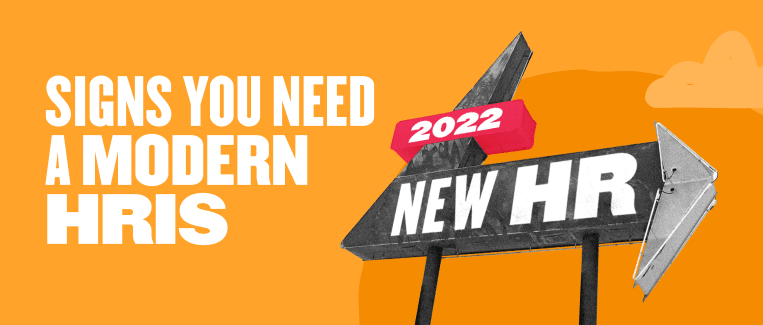Strong company cultures are essential in the modern business world. They increase workplace satisfaction and help attract professionals whose values align with those of the business. They can even have a quantifiable impact on the business’s bottom line. But how do you measure the ROI of investing in your people? Modern HR tech.
Every organization needs an effective and reliable Human Resources Information System (HRIS) that functions optimally. But a lot of the time, companies can struggle to understand when it becomes necessary to invest in a top-of-the-line solution.
As HR professionals, there are certain signs to look out for that can tell you when it’s time to take the plunge and invest in an HRIS. But that’s just half the battle. You’ll need to present your C-suite and board with concrete evidence that shows exactly what an HRIS can do for modern organizations—and what they’re missing by not having one already.
What can an HRIS do for you?
In the modern business world, HR tech is critical to success.
It can help with many things that can improve the day-to-day workings of a small, three-person business, all the way to a large corporation. In fact, in a survey by SHRM, almost 70 percent of organizations said that executing HR processes smoothly and efficiently was one of their most significant challenges.
These are the human resources processes that an HRIS excels at helping with.
So let’s take a closer look at just what an HRIS can do for you.
Increase your bottom line
An HRIS can help relieve the burden of labor-intensive, menial tasks such as HR data entry. This, in turn, helps to free up more time, effort, and resources within your HR department, allowing HR to take on a more strategic management role.
Automating these issues also allows you to cut down on costly human error and improve compliance, ultimately cutting down on the time and money spent fixing mistakes and accidentally incurring compliance fines.
Build a more robust workplace culture
Millennials currently represent around 35 percent of the global workforce, and by 2030 they will make up the majority at 75 percent. Millennial and Gen Z professionals often place as much importance on a company’s culture as they do on their salary. Moreover, Millennials are the most likely generation to leave their jobs if they aren’t satisfied with the environment.
HR software provides companies with data-based insights into the company’s DNA and the individuals who are a part of it. It serves as a central hub for employee communications and helps to foster a strong sense of community, especially for companies with remote or multi-national teams.
Boost employee satisfaction
Having a centralized and well-maintained source of people data allows businesses to make educated decisions about employee-related issues. This leaves you with an organization full of people who feel valued.
An HRIS can also streamline payroll, benefits, and the onboarding process—all while offering your people more self-service options alongside better transparency. This ultimately leads to far greater employee engagement and satisfaction and helps reduce attrition.
Save time and money on recruitment
When someone leaves a business, the rest of the staff often have to scramble to cover their duties until the company finds someone new. According to HiBob’s research with Fiverr, it takes an average of 5.4 months to fill a position. This puts undue strain on team members left to pick up the slack. Filling positions cost money as well as time. Recruiting can get expensive and eat away at the budget.
A modern HRIS can help you streamline the recruitment process and find the right candidates with the appropriate skill set much faster.
4 signs you need a good HRIS
Now that we’ve seen the benefits of HRIS let’s talk about how to tell when it’s time to finally invest in one.
1. Your HR department is overworked
The good news may be that your business is growing. The bad news is that this means tons of extra work and a huge amount of strain on your HR department—and the more overburdened your staff are, the less productive they’ll be.
Investing in an HRIS can help you automate the more menial tasks your HR department currently has to handle manually. Automation can help reduce the workload and boost productivity.
2. You manually produce your reports
Speaking of automation, if you’re hand-picking data and manually creating reports, you’re wasting time you could be spending on more critical tasks.
An HRIS can help collect critical data and automatically produce reports you can use to improve your business—saving time and effort.
3. You’re missing out on top-notch talent
Every business is running in the race for talent. With job opportunities aplenty and a stark lack of viable talent, high-value applicants can be picky about who they choose to interview with—meaning that a business’s recruitment processes are vital.
An HRIS can help streamline the recruitment process and help prevent you from missing out on talent by allowing you to offer a smoother and speedier experience for candidates.
Recommended For Further Reading
4. Your turnover rate is high
Today’s professionals want to feel heard and valued. If a company doesn’t meet their needs, they’ll look for new opportunities away from your business.
The people data an HRIS collects can point to key pain points of your team and help you make educated decisions that will enhance the employee experience.
The bottom line: Investing in an HRIS can make a huge difference to your business and your people
Modern HRIS can help reduce workloads, decrease the turnover rate, ensure compliance, and much, much more.
Recognizing that you need an HRIS can help you move your company forward with smart HR tech that makes your life easier, provides remarkable employee experiences, and improves your overall organization.


